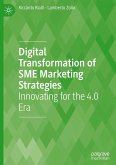Riccardo Rialti, Lamberto Zollo
Digital Transformation of SME Marketing Strategies
Innovating for the 4.0 Era
Riccardo Rialti, Lamberto Zollo
Digital Transformation of SME Marketing Strategies
Innovating for the 4.0 Era
- Broschiertes Buch
- Merkliste
- Auf die Merkliste
- Bewerten Bewerten
- Teilen
- Produkt teilen
- Produkterinnerung
- Produkterinnerung
SMEs represent more than 95% of businesses operating in global markets. These businesses are the fabric of any economic system both in developed and emerging countries, and are the main constituents of any global supply chain throughout the world. However, research on new 4.0 marketing strategies for this kind of businesses has been largely neglected. Extant literature mostly neglects, or fails to articulate the importance of emerging technology such as Big Data, Artificial Intelligence and VR/AR for SMEs. Building on that, this book reviews existing literature on innovation and new technology…mehr
Andere Kunden interessierten sich auch für
![Digital Transformation of SME Marketing Strategies Digital Transformation of SME Marketing Strategies]() Riccardo RialtiDigital Transformation of SME Marketing Strategies104,99 €
Riccardo RialtiDigital Transformation of SME Marketing Strategies104,99 €![Digital Supply Chain Management Digital Supply Chain Management]() Veda ShreeDigital Supply Chain Management29,99 €
Veda ShreeDigital Supply Chain Management29,99 €![From Single to Scale From Single to Scale]() Michael KillenFrom Single to Scale34,99 €
Michael KillenFrom Single to Scale34,99 €![Business Digital Transformation Business Digital Transformation]() Business Digital Transformation119,99 €
Business Digital Transformation119,99 €![Work Beyond the Pandemic Work Beyond the Pandemic]() Work Beyond the Pandemic119,99 €
Work Beyond the Pandemic119,99 €![Work Beyond the Pandemic Work Beyond the Pandemic]() Work Beyond the Pandemic123,99 €
Work Beyond the Pandemic123,99 €![AI Changes the Rules of the Game AI Changes the Rules of the Game]() Volker GruhnAI Changes the Rules of the Game59,99 €
Volker GruhnAI Changes the Rules of the Game59,99 €-
-
-
SMEs represent more than 95% of businesses operating in global markets. These businesses are the fabric of any economic system both in developed and emerging countries, and are the main constituents of any global supply chain throughout the world. However, research on new 4.0 marketing strategies for this kind of businesses has been largely neglected. Extant literature mostly neglects, or fails to articulate the importance of emerging technology such as Big Data, Artificial Intelligence and VR/AR for SMEs.
Building on that, this book reviews existing literature on innovation and new technology in marketing for SMEs, what they could do and should avoid. Then, presenting multiple case study from SMEs operating in diverse industries (fashion and design, food and wine, financial services), it develops a practical strategic framework that could be used by SMEs wishing to effectively innovate their marketing strategies in our contemporary digital era. It will be an essential resourcefor students and researchers of marketing, innovation and industry 4.0.
Building on that, this book reviews existing literature on innovation and new technology in marketing for SMEs, what they could do and should avoid. Then, presenting multiple case study from SMEs operating in diverse industries (fashion and design, food and wine, financial services), it develops a practical strategic framework that could be used by SMEs wishing to effectively innovate their marketing strategies in our contemporary digital era. It will be an essential resourcefor students and researchers of marketing, innovation and industry 4.0.
Produktdetails
- Produktdetails
- Verlag: Palgrave Macmillan / Springer Nature Switzerland / Springer, Berlin
- Artikelnr. des Verlages: 978-3-031-33648-5
- 2023
- Seitenzahl: 212
- Erscheinungstermin: 1. September 2024
- Englisch
- Abmessung: 210mm x 148mm x 12mm
- Gewicht: 281g
- ISBN-13: 9783031336485
- ISBN-10: 3031336488
- Artikelnr.: 71521258
- Herstellerkennzeichnung Die Herstellerinformationen sind derzeit nicht verfügbar.
- Verlag: Palgrave Macmillan / Springer Nature Switzerland / Springer, Berlin
- Artikelnr. des Verlages: 978-3-031-33648-5
- 2023
- Seitenzahl: 212
- Erscheinungstermin: 1. September 2024
- Englisch
- Abmessung: 210mm x 148mm x 12mm
- Gewicht: 281g
- ISBN-13: 9783031336485
- ISBN-10: 3031336488
- Artikelnr.: 71521258
- Herstellerkennzeichnung Die Herstellerinformationen sind derzeit nicht verfügbar.
Riccardo Rialti is an Assistant Professor of Management at the Department of Economics, Management and Quantitative Methods at the University of Milan, Italy. Previously, he has been a Research Fellow and Adjunct Professor of Management and visiting faculty at University of Lincoln, Middlesex University London, Sophia University and ESCP Europe. His-main research interests are related to digital technologies for management and marketing. Lamberto Zollo is Associate Professor Digital Marketing and Innovation in Marketing Channels at the Department of Economics, Management and Quantitative Methods at the University of Milan, Italy. His main areas of research refer to SMEs' new technologies adoption and digital transformation, as well as managerial decision-making processes in start-ups and organizations.
1 Introduction.- References.- 2 SMEs' Digital Transformation from a Marketing Perspective.- 2.1 What Does Digital Transformation Mean in the Marketing Literature?.- 2.1.1 Internet, Computer, and Businesses. A Brief Overview.- 2.1.2 The Expressions of Digital and Digital Technologies: How Do They Become Two of the Most Diffused Jargon in Management and Marketing Language?.- 2.2 The Effects of Worldwide Diffusion of Digital Processes and Transformation for SMES.- 2.3 Digitalization in Industry 4.0: A New Challenge and Opportunity for SME Marketers.- References.-3 New Technologies and SMEs' Business Model: 'Marketization 4.0'.- 3.1 The Key Drivers Shaping Future Digital Trends.- 3.2 A Holistic and Integrated Overview of New Technology Implementation in SMEs.- 3.2.1 Sensors and Actuators.- 3.2.2 Smart Beacons and Radio Frequency Identification (RFID).- 3.2.3 Mobile Technologies.- 3.2.4 Cybersecurity Tools.- 3.2.5 Internet of Things (IoT).- 3.2.6 Embedded Systems (Cyber-Physical Systems) and Cloud Systems.- 3.2.7 Additive Manufacturing.- 3.2.8 Robotics Technologies.- 3.2.9 Virtualization Techniques (Virtual Reality, Augmented Reality, and Simulation Techniques).- 3.2.10- Big Data Analytics, Machine Learning and Artificial Intelligence.- 3.2.11- Blockchain and Smart Contracts.- 3.2.12- Digital Payments.- 3.3 How Technologies 4.0 Are Affecting SMES' Business Model and Marketing Strategies.- 3.3.1 The Impact of Technologies 4.0 on Business Models.- 3.3.2 Marketing Strategists in the 4.0 Landscape: How to Lever New Technologies.- References.- 4 Marketing 4.0 for SMEs in the Digital Era: A Customer- Centric Approach.- 4.1 The Evolution of Marketing: Marketing to Digital Generations.- 4.2 Marketing in the Digital Age and the New CustomerJourney.- 4.3 Big Data for Big Profit.- 4.4 Transforming Big Data Into Small Data.- 4.4.1 Big Data, Small Data, and Smart Insights.- 4.4.2 Which Data Should SMEs Capture?.- 4.4.3 The Promises and Perils of Blockchain Protocols to Analyze Big Data.- 4.5 Emerging Mechanisms to Generate Competitive Advantage in the Digital Era.- 4.5.1 Adopting Competitive Intelligence Tools.- 4.5.2 Adapting the Value Proposition.- References.- 5 Case Studies: From Theory to Practice.- 5.1 Methodological Approach.- 5.2 Selected Cases and Data Collection.- 5.2.1 SMEs' Digitalization and Marketing in the Fashion Industry.- 5.2.2 SMEs' Digitalization and Marketing in the Food and Wine Industry.- 5.2.3 SMEs' Digitalization and Marketing in the Fintech Industry.- 5.2.4 SMEs' Digitalization and Marketing in Fashion Distribution.- 5.2.5 Home Décor and Furniture SMEs Digitalization of Marketing Strategies.- 5.3 Results: The Common Path Toward Digitalization.- References.-6 How Can Managers Transform SME Marketing Strategies in a 4.0 Fashion?.- 6.1 SME 4.0 Marketing Transformation.- 6.1.1 Identify Who Is Leading the Way.- 6.1.2 Making the Case for Digital Transformation: Crafting the Vision Within Your Business.- 6.1.3 Benchmarking Current Capabilities and Defying Resource Requirements.- 6.1.4 Integrating New Digital Technologies Into Current Systems and Processes.- 6.1.5 Handling Change Management by Managing Culture.- 6.1.6 Measuring the Outcomes.- 6.1.7 Don't Forget About Customers.- 6.1.8 Tools to Manage the Process.- 6.2 Effective Strategies and Channels for SMEs.- 6.3 Effects of 4.0 Marketing Strategies.- References.- 7 Conclusion.- References.
1 Introduction.- References.- 2 SMEs' Digital Transformation from a Marketing Perspective.- 2.1 What Does Digital Transformation Mean in the Marketing Literature?.- 2.1.1 Internet, Computer, and Businesses. A Brief Overview.- 2.1.2 The Expressions of Digital and Digital Technologies: How Do They Become Two of the Most Diffused Jargon in Management and Marketing Language?.- 2.2 The Effects of Worldwide Diffusion of Digital Processes and Transformation for SMES.- 2.3 Digitalization in Industry 4.0: A New Challenge and Opportunity for SME Marketers.- References.-3 New Technologies and SMEs' Business Model: 'Marketization 4.0'.- 3.1 The Key Drivers Shaping Future Digital Trends.- 3.2 A Holistic and Integrated Overview of New Technology Implementation in SMEs.- 3.2.1 Sensors and Actuators.- 3.2.2 Smart Beacons and Radio Frequency Identification (RFID).- 3.2.3 Mobile Technologies.- 3.2.4 Cybersecurity Tools.- 3.2.5 Internet of Things (IoT).- 3.2.6 Embedded Systems (Cyber-Physical Systems) and Cloud Systems.- 3.2.7 Additive Manufacturing.- 3.2.8 Robotics Technologies.- 3.2.9 Virtualization Techniques (Virtual Reality, Augmented Reality, and Simulation Techniques).- 3.2.10- Big Data Analytics, Machine Learning and Artificial Intelligence.- 3.2.11- Blockchain and Smart Contracts.- 3.2.12- Digital Payments.- 3.3 How Technologies 4.0 Are Affecting SMES' Business Model and Marketing Strategies.- 3.3.1 The Impact of Technologies 4.0 on Business Models.- 3.3.2 Marketing Strategists in the 4.0 Landscape: How to Lever New Technologies.- References.- 4 Marketing 4.0 for SMEs in the Digital Era: A Customer- Centric Approach.- 4.1 The Evolution of Marketing: Marketing to Digital Generations.- 4.2 Marketing in the Digital Age and the New CustomerJourney.- 4.3 Big Data for Big Profit.- 4.4 Transforming Big Data Into Small Data.- 4.4.1 Big Data, Small Data, and Smart Insights.- 4.4.2 Which Data Should SMEs Capture?.- 4.4.3 The Promises and Perils of Blockchain Protocols to Analyze Big Data.- 4.5 Emerging Mechanisms to Generate Competitive Advantage in the Digital Era.- 4.5.1 Adopting Competitive Intelligence Tools.- 4.5.2 Adapting the Value Proposition.- References.- 5 Case Studies: From Theory to Practice.- 5.1 Methodological Approach.- 5.2 Selected Cases and Data Collection.- 5.2.1 SMEs' Digitalization and Marketing in the Fashion Industry.- 5.2.2 SMEs' Digitalization and Marketing in the Food and Wine Industry.- 5.2.3 SMEs' Digitalization and Marketing in the Fintech Industry.- 5.2.4 SMEs' Digitalization and Marketing in Fashion Distribution.- 5.2.5 Home Décor and Furniture SMEs Digitalization of Marketing Strategies.- 5.3 Results: The Common Path Toward Digitalization.- References.-6 How Can Managers Transform SME Marketing Strategies in a 4.0 Fashion?.- 6.1 SME 4.0 Marketing Transformation.- 6.1.1 Identify Who Is Leading the Way.- 6.1.2 Making the Case for Digital Transformation: Crafting the Vision Within Your Business.- 6.1.3 Benchmarking Current Capabilities and Defying Resource Requirements.- 6.1.4 Integrating New Digital Technologies Into Current Systems and Processes.- 6.1.5 Handling Change Management by Managing Culture.- 6.1.6 Measuring the Outcomes.- 6.1.7 Don't Forget About Customers.- 6.1.8 Tools to Manage the Process.- 6.2 Effective Strategies and Channels for SMEs.- 6.3 Effects of 4.0 Marketing Strategies.- References.- 7 Conclusion.- References.








